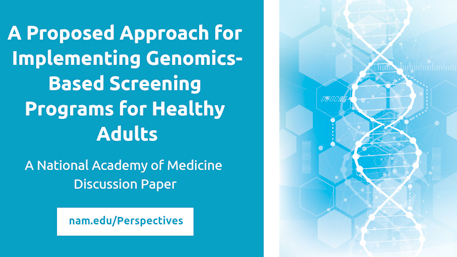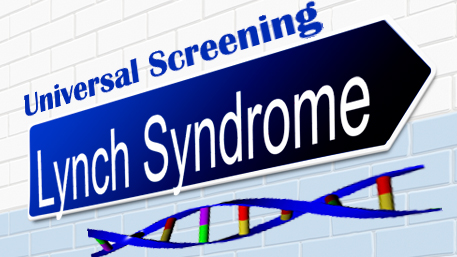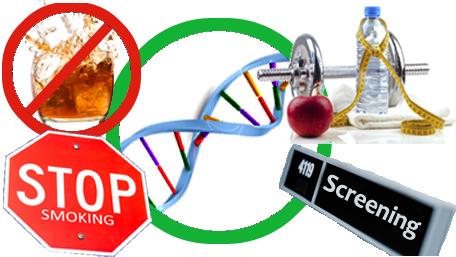Category: screening
The Long Road to Population-based Genomic Screening

Since 2012, the CDC Office of Genomics and Precision Public Health (OGPPH) has identified three autosomal dominant conditions for which there exist evidence-based recommendations to prevent morbidity and mortality from either cancer or heart disease. Using our evidence-based framework, we have collectively labeled the following conditions as tier 1 genomic applications: 1) hereditary breast and Read More >
Posted on by 3 CommentsImplementing Genomics-Based Screening Programs for Healthy Adults: A Proposed Evidence-based Approach from the Genomics and Population Health Action Collaborative

The following report was developed by the Genomics and Population Health Action Collaborative (GPHAC) as a potential roadmap for groups planning to carry out projects involving genomics-based screening programs in the healthy adult populations. The report is available in its entirety on the National Academy of Science, Engineering and Medicine website. The advent of next Read More >
Posted on byWhen Should You Be Screened for Colorectal Cancer?

Starting at the right time saves lives. People with a family history of CRC may need to start much earlier. Doctors and public health professionals strive to live by the creed “First, do no harm” but often wrestle with difficult choices, including when and how often screening tests should be conducted. Effective prevention of colorectal Read More >
Posted on byUniversal Screening for Lynch Syndrome: Can Tumor Sequencing Have a Larger Public Health Impact on Treatment and Prevention of Colorectal Cancer?

Lynch syndrome (LS) is the most common hereditary syndrome associated with increased risk of colorectal cancer (CRC), accounting for about 3% of CRC patients. LS is a dominantly inherited condition with mutations in several mismatch repair (MMR) genes. Persons with LS are also at increased risk for endometrial and other cancers. Lynch syndrome affects 1 Read More >
Posted on byTrends and Factors Affecting Utilization of BRCA Testing in the United States: The Need for Improved Surveillance

This blog post is a summary of two recent CDC papers on the trends in utilization of BRCA testing in the United States, and metropolitan-nonmetropolitan areas differences in testing. Women with pathogenic BRCA mutations have an estimated 45–65% risk of breast cancer and a 17–39% risk of ovarian cancer by age 70, as compared with Read More >
Posted on byCan we use genetic screening of healthy populations to save lives and prevent disease? Join the conversation.

On January 30, 2017, CDC held a special workshop to discuss the role of public health in the implementation of genetic screening programs beyond the newborn period. The workshop brought together panelists from the worlds of medical genetics and public health practice, including cancer, birth defects, and laboratory science. Workshop presenters and a CDC panel discussed Read More >
Posted on by 6 CommentsFrom One Hundred Thousand Genomes in the United Kingdom to Millions of Genomes in the United States: What Lessons Can we Learn?

In recent years, the United Kingdom (UK) has made a major commitment to developing a large scale population cohort study (100,000 genome project), linking high quality genomic sequence data to electronic health record information for the purposes of scientific discovery and clinical care improvement. The plan is for this project to continue well into the Read More >
Posted on byHappy Thanksgiving: Collect & Act on Your Family Health History

As you celebrate Thanksgiving with your family this November, remember that this special day is also National Family Health History Day. Family health history is important to your health and can help you detect unique disease risks and manage them before becoming sick, or find the right diagnosis and treatments when you have a certain Read More >
Posted on byThe Cancer Moonshot, Hereditary Cancers and Population Genetic Screening

In September 2016, the Cancer Moonshot Blue Ribbon Panel delivered a report with 10 ambitious recommendations to shape cancer research for the next five years. One recommendation is to “expand use of proven prevention and early detection strategies.” [PDF 199 KB] There is a lot we can do to prevent cancer now— even with no Read More >
Posted on byDoes genetic risk information improve healthy behavior? Let’s not throw out the baby with the bath water!

In a recent systematic review with meta-analysis, Hollands et al evaluated the impact of communicating genetic risk information on risk-reducing health behaviors and motivations for behavior change. The authors reviewed 18 studies with 7 behavioral outcomes, including smoking cessation, diet and physical activity. They found no significant effects of communicating DNA based risk estimates on Read More >
Posted on by

